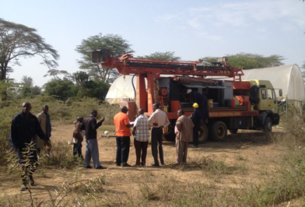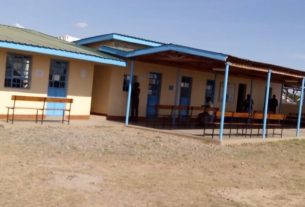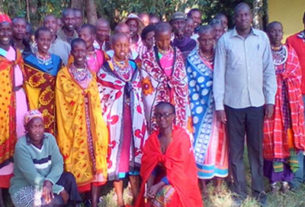This report covers interventions by the PD Foundation funded project for COVID 19 Response in Mara Rianta Catchment area targeting to limit the spread of COVID-19 and reduce its impact on Health care service providers and households through increasing the knowledge and practice in line with the COVID 19 guidelines by the World Health Organization (WHO) through the Kenya Ministry of Health (MoH).
The month of June was characterised by a dry weather and with the Masai Mara Game reserve closed due to the COVID 19 Pandemic, the communities went on with their activities mainly focusing on livestock rearing. The focus of the PD funded COVID 19 response project was community sensitization, distribution of PPEs and sanitizers, fumigation, installation of hand washing stations and surveillance on the status of churches in preparation for reopening – aligned to COVID 19 guidelines. In partnership with the Narok County Ministry of health, surveillance and contact tracing at the catchment area, county and sub county Team (Monitoring and surveillance in Trans Mara West- Lolgorian and Kimintet) was enhanced through weekly field visits, virtual and face to face meetings with the CHP Mara Rianta COVID 19 Response team
- Mara Rianta COVID 19 June 2020 Project Achievements
To limit the spread of COVID-19 and reduce its impact on Health care service providers and households in Mara Rianta Health facility catchment area by July 2020, the project focused on increasing knowledge on COVID 19 and enhancing preparedness and response in Mara Rianta catchment area.
| CHP Director – John Sankok (standing in striped shirt at holding a poster) teaching CHVs on how to use a poster during a community awareness session at Lolgorian ward |
1.1 Enhanced preparedness and response at Mara Rianta
Community sensitization
| CHV training community members at Kimintet ward using the skills gained from the training by CHP with the support of PD Foundation |
| A Village elder washing hands after arriving from herding cattle using the hand and soap dispensers provided through PD Foundation support |
The CHVs, Health facility workers and church leaders sensitized on COVID 19 evidence-based information sharing in line with the government guidelines reach out to communities by organizing weekly small group meetings, house to house outreaches and utilizing every available opportunity to sensitize. Consequently, they were able to reach —–(——Male and —-female) during the month of July. Knowledge and practice have significantly changed as evidenced in the use of face masks, hand washing and social distancing in section of the community.
However, more needs to be done as social cultural norms are affecting especially the social distancing aspect and the costs of face masks.
1.2 Enhanced preparedness and response at Mara Rianta
Distribution of PPEs, disinfectants and sanitizers
100 PPE kits (N95 Masks, Googles, Protective body suit, Facial Shields, Gumboots), 200 surgical masks, 100 N95 Masks, 40 Thermal guns, 60 Heavy Duty gloves, 2650 (Packed in 200 ml) bottles and 30 hand washing stations(soap and water dispensers) were distributed to Community leaders, CHVs and all health care workers in the catchment area as a preparedness and mitigation measure for COVID 19. The Health facilities were provided with chlorine disinfectant for fumigation on the facilities and all meeting venues within their jurisdiction.
| The trained community health workers dressed in the protective gear/PPE during a fumigation exercise in Mara Rianta Area |
- The PPE kits
The PPEs kits for use when handling suspected cases of COVD 19 at the facility and during fumigation of areas where confirmed COVID 19 cases are found. 60 CHVs and 40 health care workers were provided with N95 Masks for use during day to day activities at the facilities and the community so as to protect the front-line staff and the CHVs from infection with COVID 19
- Fumigation- disinfection
| Mara Rianta COVID 19 Project coordinator conducting a training on Hand washing using the soap and water dispensers provided by the PD Funded Project |
The health care workers continued to fumigate the facilities to ensure that there are no cross infections among clients and to health heath care workers in case unidentified cases of COVID 19 are at the health facilities. Close monitoring by CHP to ensure sustained hygiene standards are maintained in all meeting places was enhanced with fumigation of the homes and public venues taking precedence to ensure limited spread of COVID 19. In addition to the four health facilities in the catchment area, 10 other public venues (Community meeting places and chief’s office) were fumigated
- Installation of hand washing stations
To ensure hand washing practice is enhanced in the community as the most sustainable way of hand sanitization, 400 soaps and 60 soap and water dispensers were procured and distributed to 5 health facilities (10 with 2 per facility) in the catchment area, 12 Churches, 5 communal homesteads (Manyattas). The remaining 33 soap and water dispensers are to be distributed to churches as they prepare to reopen probably in July or after.
- Surveillance
- Surveillance on the status of churches in preparation for reopening – aligned to COVID 19 guidelines.
Three Meetings with religious leaders held during the month revealed that approximately 70% of the population in the project catchment area attend the 68 churches distributed across the three administrative wards. Discussions with the church leaders and a spot check of a few churches revealed that the church leadership has not prepared in any way to align with the COVID 19 guidelines yet they are ready to open the churches once the government allows them to do so. CHP trained 12 pastors on the COVID 19 church reopening guidelines and requested them to reach out to other religious leaders by sensitizing them and ensuring the church is well prepared as they await the government directives on church reopening.
- Surveillance and contact tracing at the catchment area
The Narok County and sub County Team in partnership with the CHP continued to conduct monitoring and surveillance at Mara Ward in Narok west Sub County, Lolgorian and Kimintet Ward in Trans Mara West sub county through weekly field visits, virtual and face to face meetings with the CHP Mara Rianta COVID 19 Response team
During the surveillance, National, County, Sub county and administrative Wards COVID 19 trends (Positive cases, preparedness and response) were monitored. In Kenya (as of 30th June 2020) the Confirmed cases increased from 1,888 in May to 6366, Deaths 63 to 149, Recovered 464 to 2013 with Nairobi, Mombasa, Busia, Kajiado and Kiambu remaining the most affected counties. In Narok County, reported the first case on 13th June 2020 and this increased to 26 by 1st June 2020[1].
| Number of COVID 19 related cases on follow up in Narok county (1st July 2020) |
The Mara Rianta Catchment area covers parts of Narok West (Mara Ward) and trans Mara West (Lolgorian and Kimintet Wards). During the month of June 594 samples of suspected COVID 19 cases and Contacts were collected in Narok county and tested were tested up from 214 samples in May. The cases on quarantine and Isolation are distributed as shown in the table on the right
Challenges
As started in last month report, catchment area vastness, the threat of wildlife attack limiting the movement of CHVs, poor road network leading to increased travel costs, high illiteracy levels and the sociocultural issues around social distancing, wearing masks and other COVID 19 guidelines continue to be some of the key challenges experienced.
Other challenges noted during this reporting period were
Increased anxiety and panic
Well before the first case was reported in Kenya, the scare of Corona was high among the target community. The first case of COVID 19 in Mara Rianta Catchment area was reported at the beginning of July (through not during the period under review) and this saw a heightened increase in anxiety and panic in the villages with suspected cases of COVID 19. Stigma and fear for the unknown with the villages where one COVID 19 positive case was reported becoming completely alienated and branded as Corona villages.
Unprepared Community for the reopening of the economy
Though there are discussions in Kenya on reopening the economy and the religious places of worship, Mara Rianta catchment area is completely unprepared. The community is not ready to receive visitors for fear of contracting the dreaded disease. The Religious leaders have not been able to prepare the churches in alignment with the COVID 19 guidelines because
- Followers are yet to internalize and practice the guidelines such as social distancing, hand washing and wearing of Masks among others
- With the Masai Mara game reserve not operational, the livelihoods of the people are adversely affected and therefore cannot support with the funds required to equip the places of worship with hand washing station, sanitizers and thermo guns among others
- Religious leaders are grappling with the challenge of how to divide the congregants to fit in the places of worship in alignment with the COVID 19 requirements
- Lessons Learnt
- There is need to mainstream psychosocial support to households with family members on quarantine and isolation so as to reduce the psychological and social effects of the anxiety and panic
- Religious leaders and CHVs need training on psychosocial support amid the COVID 19 Pandemic season so as to support since they are based in the community
- With the high level of Illiteracy, continuous/follow up sensitization is very important to ensure learning about COVID 19 is internalized
- There is need to mainstream on other illnesses -Malaria is still a threat in this community and therefore necessary to be addressed so as to reduce morbidity.
- The plan of action for July 2020
Conclusion
With the eminent threat of COVID 19, the efforts by PD foundation to prepare the community and health facilities to respond to COVID 19 has started to create impact in the community as evidenced by the strict adherence to the ministry of health guidelines on COVID 19 at the heath facility and increased awareness among community members.




